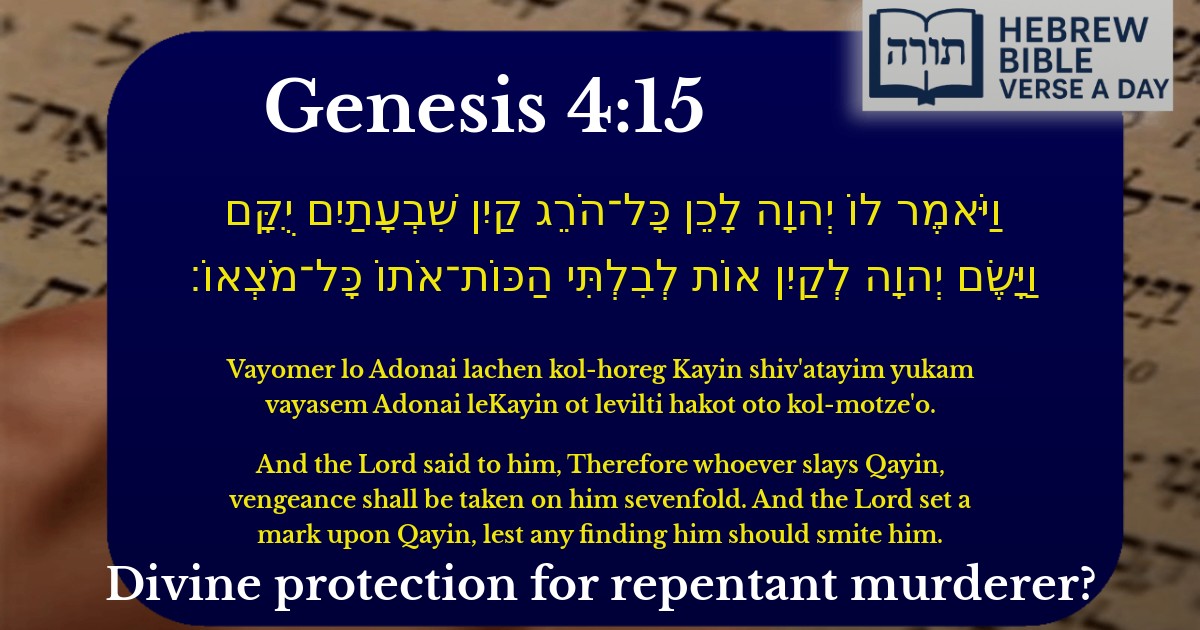Join Our Newsletter To Be Informed When New Videos Are Posted
Join the thousands of fellow Studends who rely on our videos to learn how to read the bible in Hebrew for free!
Hebrew Text
וַיֹּאמֶר לוֹ יְהוָה לָכֵן כָּל־הֹרֵג קַיִן שִׁבְעָתַיִם יֻקָּם וַיָּשֶׂם יְהוָה לְקַיִן אוֹת לְבִלְתִּי הַכּוֹת־אֹתוֹ כָּל־מֹצְאוֹ׃
English Translation
And the Lord said to him, Therefore whoever slays Qayin, vengeance shall be taken on him sevenfold. And the Lord set a mark upon Qayin, lest any finding him should smite him.
Transliteration
Vayomer lo Adonai lachen kol-horeg Kayin shiv'atayim yukam vayasem Adonai leKayin ot levilti hakot oto kol-motze'o.
Hebrew Leining Text
וַיֹּ֧אמֶר ל֣וֹ יְהֹוָ֗ה לָכֵן֙ כׇּל־הֹרֵ֣ג קַ֔יִן שִׁבְעָתַ֖יִם יֻקָּ֑ם וַיָּ֨שֶׂם יְהֹוָ֤ה לְקַ֙יִן֙ א֔וֹת לְבִלְתִּ֥י הַכּוֹת־אֹת֖וֹ כׇּל־מֹצְאֽוֹ׃
וַיֹּ֧אמֶר ל֣וֹ יְהֹוָ֗ה לָכֵן֙ כׇּל־הֹרֵ֣ג קַ֔יִן שִׁבְעָתַ֖יִם יֻקָּ֑ם וַיָּ֨שֶׂם יְהֹוָ֤ה לְקַ֙יִן֙ א֔וֹת לְבִלְתִּ֥י הַכּוֹת־אֹת֖וֹ כׇּל־מֹצְאֽוֹ׃
🎵 Listen to leining
Parasha Commentary
📚 Talmud Citations
This verse is quoted in the Talmud.
📖 Sanhedrin 37b
The verse is discussed in the context of the divine protection granted to Cain, illustrating the principle of divine justice and mercy.


The Divine Protection of Kayin
The verse describes Hashem placing a protective mark on Kayin after he killed his brother Hevel. Rashi explains that this "mark" (ot) was either a letter from Hashem's name (as per Bereishit Rabbah 22:12) or a miraculous sign—such as making Kayin's face shine—to warn others not to harm him (Rashi on Bereishit 4:15). The Ramban suggests it may have been a physical sign, like a horn, to distinguish him.
The Sevenfold Punishment
The phrase "שִׁבְעָתַיִם יֻקָּם" (vengeance sevenfold) is interpreted in multiple ways:
Why Protect a Murderer?
The Talmud (Sanhedrin 37a) derives from this episode the principle of pikuach nefesh (sanctity of life)—even a sinner like Kayin retains inherent value as a human being. The Sforno adds that Hashem’s mercy extended to Kayin to demonstrate that repentance is always possible.
The Nature of the "Mark"
Midrash Tanchuma (Bereishit 9) suggests the mark was a dog assigned to guard Kayin, symbolizing that even the lowest creatures can serve divine justice. Alternatively, the Zohar (1:36b) teaches that the mark was a spiritual sign, ensuring Kayin would not be killed before his appointed time.